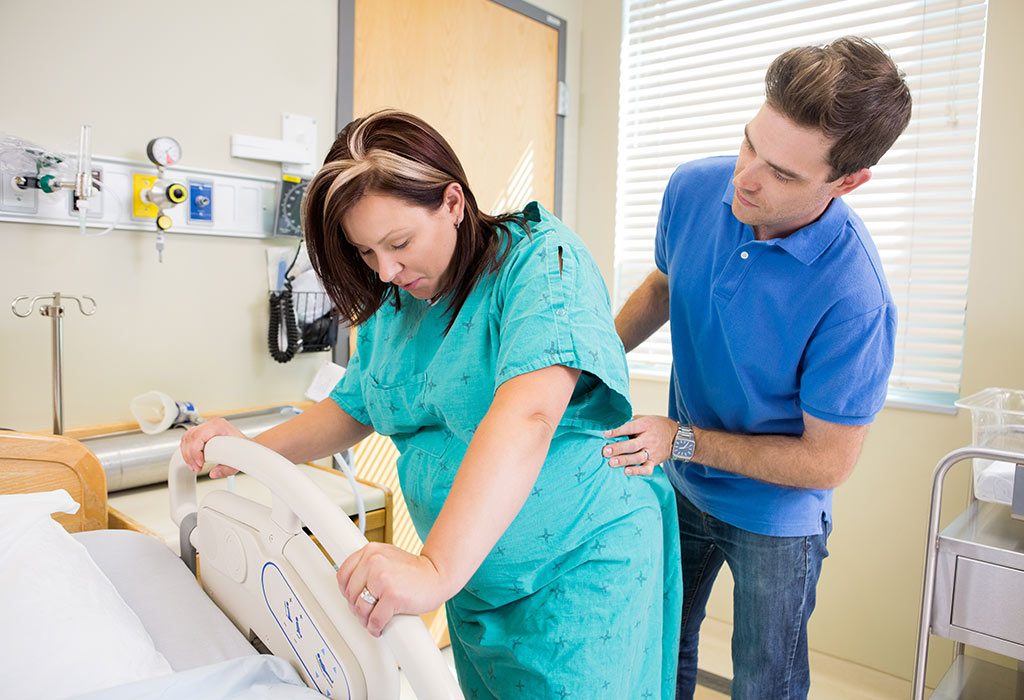Yes, Believing is Achieving!
You may not know this, but I'm also a spin instructor. I've been spinning for more than 10 years and I'm so passionate about it! Turns out, a lot of what I teach and practice during my classes perfectly applies to unmedicated labor. Think about it. A one-hour spin class is a huge physical feat that can seem daunting, yet other people can achieve it. Some even come back for more! They sweat, let go of inhibitions, push themselves past their known limit, go inward, connect with their breath, and feel euphoric when done. You might wonder what those athletes have that you don't.
Want to know the secret? It's peak performance! When you activate the parasympathetic nervous system, you tap into your peak performance. Everything You Need to Know Before Your Induction
Inductions are pretty commonplace here in the States (about 25% of labors are induced), but that doesn't mean you are just a number, too. You can definitely come in prepared and make the most of this experience.
I'd also like to mention that time can sometimes feel like the enemy during inductions. If you're "stuck" at 3 cm after 6 hours, it might seem like you'll be doing this for-e-ver and the induction might be deemed failed or the hospital might make you feel rushed, but remember that many pregnant people are (sometimes unknowingly) at 3 cm for up to a week and no one even bats an eye at that. The fact that you have to sit and watch the clock between four white walls makes time seem cruel. Trust that if others can take their time at 3 cm, so can you! The following info applies to labors with no complications to the laboring person or the baby. Simple things can make a huge difference in improving your labor experience.
When we know better, we do better! Bonus: Not sleeping or resting in the beginning of labor, especially if you're being induced. Why Exploring Your Unwanted Birth Matters
When it comes to labor prep you know to get your body ready for the big day. You will practice yoga, find a breathing technique that works for you, fuel your body with the right food, and become mindful of your body's mechanics. But did you know the most important work in labor is mental?
The deepest work you will do in labor is emotional, mental, and spiritual. You will need to surrender to the great mystery that is childbirth. You will not know how or when baby will come. You will need to give up any time limits, expectations, and control to go deep within yourself and labor peacefully. Labor is not a time for holding back our primal instincts or allowing fear to hold us back. It's a time of surrender and acceptance. Tips From a Doula Who Knows What Works
Maybe the hospital amenities or sense of safety have drawn you in. Or maybe you can't imagine delivering without your rock star team. Or maybe hospital births are just the way things are done. Whatever the reason, I'm sure you want to make it the best possible experience and avoid any unnecessary interventions.
BEFORE YOU GO •Read up on your hospital's policies and discuss the ones you aren't comfortable with to try and find a compromise or alternative with your care team. •Tour the hospital and learn how to enter the labor and delivery department (after hours too). Find out what the in-processing procedure looks like, what you can sign ahead of time, and what is done during triage. Ask what signs you need to show before being admitted.
Sometimes the amount of info out there regarding VBAC can be overwhelming, confusing, and at times plain false! It can be tricky navigating through all that noise, so I've narrowed it down for you. Read on to learn how YOU can stay informed and in control of your care.
Your provider is a key person in the success of your VBAC and it's very important to find someone who is supportive, not just tolerant. Remember that yes, no one can legally force you to have a C-section nor deny you care even if the hospital has a VBAC ban, but it's also important to know ahead of time if your hospital has the tools and staff to support a true C-section emergency. You really can't force a hospital to treat you if they don't have the means. And if your provider is suggesting a repeat C-section, don't dismiss the advice so quickly. Really talk to them about their concerns to find solutions and compromises. Sometimes having a repeat C-section is truly medically necessary and your best option. Next time you see your provider ask: •How long will you allow me to remain pregnant? Why do you prefer that date? •Will we attempt an induction? Which methods will be used? •How will I be monitored during labor? •How do you feel about me laboring as long as possible as long baby and I are doing well? •At what point during labor will a C-section be needed? Also, ask yourself:
So, maybe you are new to this doula thing or all of your friends have gotten one for their labors and swear they couldn't have done it without the help of a doula. Now you're wondering if you should get one too. I mean, all the cool kids are doing it, right?
Even though I'd love your business, I'm not going to lie to you. Doulas aren't the only ones who can improve your birth experience. I say it all the time, surround yourself with the RIGHT people! Studies have shown that having doula support during pregnancy and labor can decrease your chances of a C-section, need for pain medication, and assisted delivery. We can also increase your overall satisfaction with your birth experience and improve breastfeeding and bonding outcomes. But how does a doula have that effect and can anyone else give you those amazing outcomes? When choosing a provider, remember that YOU are the customer and you have choices. If you're not vibing with your provider, move on and find someone who will support you. Be honest with your doctor and tell them there are a few important questions you'd like to ask. If they don't even take the time to hear you out then that's your sign to find someone else. It's best to know early on if they're a good match for your labor experience. Keep in mind that there is no labor police and you have total autonomy over your body and baby's. Provider preference/recommendation is not law and you have the right to choose what feels right to you, even if it's outside of the norm. If you truly have no say about which provider you get and you're not quite comfortable with them, consider switching to a midwife, a home birth, laboring as long as possible at home, or having a rockstar support partner with you at the hospital. QUESTIONS TO CONSIDER WHEN CHOOSING A PROVIDER: -Do you support unmedicated births and what are your views on them? -How do you support medicated births and what are your views on them? -Do you support breech births, how? -Who are your backups and will I meet them? -How do you feel about doulas? -How do you feel about birth plans? -What are your induction and C-section rates? -Do you support a VBAC and how do you ensure it'll be as successful as possible? -How do you view pain during labor? -What is your plan if I go past my due date? -How many hours will you allow me to labor after my water breaks? -How long will you allow the umbilical cord to remain attached? -Will you administer Pitocin to deliver the placenta? Remember that if you choose an OB you will likely only labor with them for a short while, as they tend to cover multiple births at a time. Still, knowing ahead of time how they can support you during the expected and unexpected can help you decide who better aligns with your wishes. For an even better experience, choose your hospital wisely and get support from a doula, or make sure you and your birth partner are well-educated and able to make decisions during complex situations. Choosing your hospital is just as important as choosing a provider. You will likely labor with the staff much longer than you will with your provider so be sure they can meet your needs.
Call the Labor and Delivery Department, take a tour, or visit their website to find the answers. QUESTIONS TO CONSIDER WHEN CHOOSING A HOSPITAL -What kind of pain medication do you offer? -What laboring tools do you provide (birth ball, stool, tub, etc.)? -When are vaginal exams performed and are they required? -How is baby's progress monitored? -Am I allowed to eat, drink, and move freely? -What are your C-section and induction rates? -How do you support complicated births? -Do you support breech births, multiples, and VBACs? -What procedures do you follow immediately after birth for mom and baby? When do they begin? Are any of these optional? -What security measures do you have in place? -What do you provide during my stay? -How are you prepared for emergency situations? -Do you have a NICU? These are all excellent questions to get a conversation started, but remember that your birth education and support system have an even greater impact on your experience than where you deliver. What to Bring to the Hospital Without Overdoing it
Great news! Hospital births are so much more accommodating than they were 20 years ago. Gone are the days of cold, sterile rooms with little to help parents feel at home. These days, labor rooms are equipped with comfy beds that move into all sorts of positions and can accommodate stirrups and a squat bar. Most rooms also include T.V.s, music players, birth balls, dimmable lighting, a space for partners to spend the night, and a few even have birth tubs. Mom can expect to receive postpartum pads, padsicles (frozen pads to help with swelling), disposable mesh underwear, and a breast pump to borrow. Baby will have diapers, wipes, bottles, a pacifier (if allowed), and hospital clothing. No need to fret and overpack a hospital bag!
So what exactly do you NEED to bring?
I also recommend you choose the right bag/suitcase for your items. Find one that has plenty of compartments and store things according to when you'll need them or by purpose (labor, toiletries, postpartum, nursing) so you don't have to rifle through the bag and make a mess. Large zip bags make organizing much easier! |
Archives
February 2024
Categories
All
|
|
Guiding Gates Doula LLC
|
(719) 428-6929
|
Hampton • Norfolk • Williamsburg • Yorktown • Newport News • Smithfield














 RSS Feed
RSS Feed